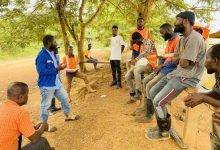Some Medium, Small and Micro Enterprises (MSMEs) in the Northern, Northeast and Savannah regions, who received government’s funds under the COVID-19 support interventions, have testified that the funds have helped to sustain their businesses.
This formed part of the findings of a community scorecard on the implementation of the government’s relief packages to mitigate the impact of the COVID-19 pandemic on the operations of MSMEs in seven selected districts in the three regions.
The scorecard assessed the government’s COVID-19 support interventions in the areas of information dissemination and public education, application and selection process, benefit and impact and accountability
The scorecard assessed the government’s COVID-19 support interventions in the areas of information dissemination and public education, application and selection process, benefits and impact, and accountability.
The findings were presented at a meeting in Tamale.
The compilation of the community scorecard was undertaken by the Ghana Developing Communities Association, an NGO, with support from STAR Ghana Foundation and the Foreign Commonwealth and Development Office as part of the Baobab Initiative for Social Accountability (BISA) on Government’s Response to COVID-19 project.
The BISA project, implemented from September 2021 to March 2022, sought to assess the impact of government’s support to MSMEs and how effective the government’s support had been from the perspective of the beneficiaries.
The COVID-19 pandemic emerged in the country in March 2019 and brought about disruptions to activities including operations of businesses leading to loss of jobs, collapse of some businesses and a loss to some businesses.
In view of this, the government launched the Coronavirus Alleviation Programme Business Support Scheme (CAP-BuSS) programme and the Ghana COVID-19 Alleviation and Revitalisation of Enterprises Support (Ghana CARES) programme where MSMEs amongst others across the country were to apply to receive some funding to support their operations.
The scorecard also found that while some MSMEs made good use of the funds, others saw it as free money and mismanaged it.
It also found that the application process to receive the funds was not decentralised enough and was characterised by partisan politics and added that there was also no proper needs assessment conducted before the support was given to some applicants.
Following the findings, the scorecard awarded an overall score of 43 per cent to the government the way it implemented its COVID-19 relief packages.
It recommended that announcements on any such support packages should be made through traditional media, social media platforms and other local information centres to increase the reach to many more people, especially the non-literate populations.
MrIssah Osman, Head of Business Advisory Centre at the Savelugu Municipal Assembly, acknowledged the issues raised as part of the scorecard, saying the lessons learnt would improve delivery of subsequent interventions.
Rita Ntoso, Programmes Officer of STAR Ghana Foundation, said the gaps observed by the scorecard in terms of information sharing and the application process for the government’s COVID-19 support meant that the government must use local information centres to disseminate information on such packages in future.
Alhaji Osman Abdel-Rahman, Executive Director of Ghana Developing Communities Association said state authorities would be engaged on the findings of the scorecard to ensure that they put in place measures to address the situation in subsequent editions. – GNA



